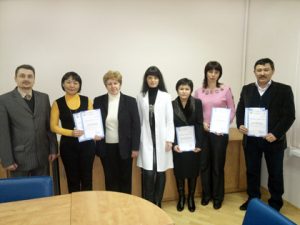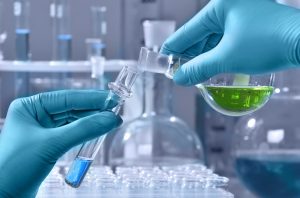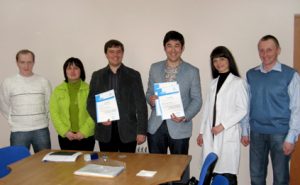Dear colleagues!
In recent years the amount of laboratories in different fields and directions has increased. It concerns both public and state. Intensive development of production requires appropriate research support, input and output laboratory control.
The question of the quality and safety research of not only finished products but also of raw materials, the environment objects are getting more and more important and the results of research are gaining public resonance.
With the large experience in organization of modern laboratory activities, with the new techniques and methods and with highly skilled stuff we propose providing you and your employees with a part of our knowledge and skills.
ULQS of AIC of the National University of Life and Environmental Sciences of Ukraine will help to master modern generally accepted methodologies and prepare laboratory assistant, engineering, scientific and administrative stuff for laboratories according to individual programs.
All our employees have been trained in both Ukraine and leading scientific institutions in the world. Ensuring constant professional development is one of the main aims of the Ukrainian laboratory of quality and safety of agro-industrial complex.
The expense for staff training is not losses for us but investment and therefore the main source of future income!
Today a providing of all customer requirements and high-quality and timely execution of works is possible only by competent, trained, with the useful staff skills.
That is why we offer staff training programs in the following directions.



Training and retraining services of laboratory staff *
|
№ |
Course Name \ direction of training |
Duration of training |
| 1 | Training and qualification of a laboratory assistants and engineering staff of laboratories |
Individual program |
| 2 | Training and retraining of laboratory research staff |
Individual program |
| 3 | Training of administrative and economic staff of laboratories |
Individual program |
| 4 |
Implementation of quality management systems of research laboratories: an analysis of the requirements of DSTU ISO / IEC 17025: 2006 and approaches for their implementation and realization |
4 |
| 5 | Qualitative and quantitative determination of genetically modified organisms (GMO) of plant origin in raw materials, food and feed by real-time PCR |
5 – 9 |
| 6 | Modern molecular genetic research methods for animal husbandry products |
5 |
| 7 | Determination of mycotoxins by the enzyme-linked immunosorbent assay and high performance liquid chromatography in cereal, animal feed |
5 |
| 8 | Falsification of milk fat by non-dairy and modern methods for its detection |
5 |
| 9 | Using of the method EN 15662 – 2008 (QuECHERS) for the determination of pesticide residues in grain, vegetables |
5 |
| 10 | Using of the method DSTU EN 12393-2 – 2003 for the determination of pesticide residues in grain |
5 |
| 11 | Determination of the mass concentration of pesticides in the soil by the method of gas-liquid chromatography by MRT № 081 \ 12-0543-08 and the method QuECHERS |
5 |
| 12 | Gas chromatography method |
8 |
| 13 | Gas chromate mass spectrometry method |
8 |
| 14 | Method of liquid chromatography (including MS / MS) |
5 |
| 15 | Determination of basic hydrochemical indicators of water quality |
5 |
| 16 | Theoretical and practical basis of physical-chemical analysis of soil in the agrochemical laboratory |
3 |
| 17 | Assessment of the suitability and preparation of soil for the cultivation of fruit and berry cropsвирощування плодових і ягідних культур | |
| 18 | Diagnostics of decorative (softwood and hardwood) and fruit trees. Methods of prevention and protection of decorative and fruit plantations from major pathogens |
3 |
| 19 | Diagnosis of diseases of cultivated mushrooms and the identification of their pathogens |
5 |
| 20 | Basics of the excreta and identification of certain groups of micromycetes (on request) |
2 |
| 21 | Work with microscopes of falling and cross-cutting lighting, micrographs |
2 |
| 22 | Biological method of analyzing seed infection by diseases (DSTU 4138-2002) – determination of seed infection by fungal and bacterial pathogens using wheat, barley, soybeans as an examples |
2 |
| 23 | Assessment of quality of entomophage laboratory cultures and a decisive factor for their effectiveness in agrocenoses |
2 |
| 24 | Assessment of level of infection of plant biomaterial, grain and grain products, other agricultural products by pests |
2 |
| 25 | Scientific principles of the environmental impact assessment of the protection of vegetable and fruit agrocenoses |
3 |
| 26 | Entomophagous and biological products are a part of environmentally friendly technologies for the protection of agrocenoses |
3 |
| 27 | Determining the quality of grain and its processing products using new instruments and standards |
7 |
| 28 | Determination of the quality of feed, mixed feed and feed additives |
7 |
| 29 | Determination of amount of gamma-emitting radionuclides in environmental objects using gamma spectrometers with scintillation detectors |
2 |
* We offer an individual approach to the development of any training programs and directions of training in order to meet your training and retraining needs.
For questions about holding and organization of trainings, the development and approval of programs please contact Xenia by telephone (044) 527-80-44 or (044) 526-45-03 and E-mail quality_ua@ukr.net or quality@quality.ua
We work with you, for you and for the prosperity of Ukraine!
Ця публікація також доступна такими мовами: Ukrainian



